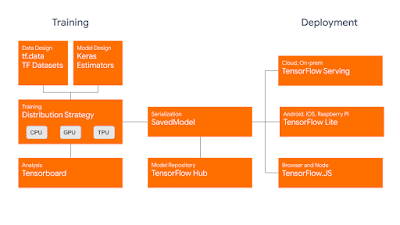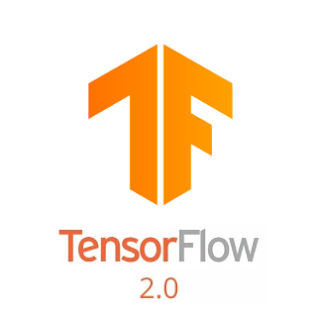After months in the Alpha state, Google has now released the final stable version of TensorFlow 2.0.
TensorFlow 2.0 aims at providing a easy to use yet flexible and powerful machine learning platform.
The new version also hopes to simplify deployment of TF models to any platform by standardizing the model formats. You will be able to run TensorFlow models on a variety of runtimes, such as using TensorFlow Serving - a flexible, high-performance serving system for machine learning models, designed for production environments -, on browser or through Node.js using TensorFlow.js, and on mobile through TensorFlow Lite.
 |
| TensorFlow 2.0 Deployment Options (Image source: https://medium.com/tensorflow/tensorflow-2-0-is-now-available-57d706c2a9ab) |
TensorFlow 2.0 provides a more tighter integration with Keras. Using tf.keras you will be able to run any Keras compatible code.
import tensorflow as tf from tensorflow import keras # your Keras code here #.... OR.... from tensorflow.keras import layers model = tf.keras.Sequential() # Adds a densely-connected layer with 64 units to the model: model.add(layers.Dense(64, activation='relu')) # Add another: model.add(layers.Dense(64, activation='relu')) # Add a softmax layer with 10 output units: model.add(layers.Dense(10, activation='softmax'))
TensorFlow 2.0 also offers Multi-GPU support, and claims to deliver up to 3x faster training performance using mixed precision on Volta and Turing GPUs.
There are many more improvements in TensorFlow 2.0. Read the full release announcement here: https://medium.com/tensorflow/tensorflow-2-0-is-now-available-57d706c2a9ab
TensorFlow Serving Models: https://www.tensorflow.org/tfx/guide/serving
tf.keras integration: https://www.tensorflow.org/guide/keras/overview
Migration Guide from TensorFlow 1.0 to 2.0: https://www.tensorflow.org/guide/migrate
There are many more improvements in TensorFlow 2.0. Read the full release announcement here: https://medium.com/tensorflow/tensorflow-2-0-is-now-available-57d706c2a9ab
TensorFlow Serving Models: https://www.tensorflow.org/tfx/guide/serving
tf.keras integration: https://www.tensorflow.org/guide/keras/overview
Migration Guide from TensorFlow 1.0 to 2.0: https://www.tensorflow.org/guide/migrate
Build Deeper: The Path to Deep Learning
Learn the bleeding edge of AI in the most practical way: By getting hands-on with Python, TensorFlow, Keras, and OpenCV. Go a little deeper...
Get your copy now!



No comments:
Post a Comment